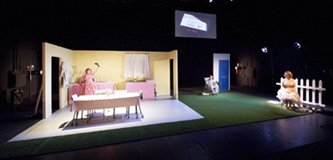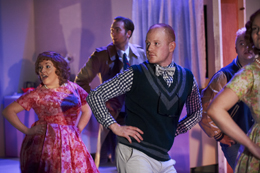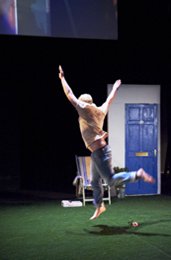How do you solve a problem like The Family? Make a cup of tea, of course. But there comes a time when even that – our nation’s reflex action to anything remotely real – becomes an impossible task. Behind the whiter-than-white picket fence perfection cracks appear, holes show, the plywood walls tremble and things begin to crumble. Thankfully, it’s a much more enjoyable experience watching it happen to someone else’s family. In fact, we are drawn to it, addicted to it, in the daily doses of Soaps and reality TV we consume in terrifyingly desensitized states of semi-consciousness. But this family is different, because, as we are warned in the show’s programme, when it ends it feels much too like our own.
 THEATREclub’s The Family, a revision of last year’s piece of the same name, welcomes us to the extraordinarily ordinary goings-on at No. 23 on a Friday in winter. Despite the seasonal specification, however, (reported to us at exactly “zero minutes in” by our persistent time-keeper, Gemma Collins, or more aptly, ‘Gem-Gems’), the characters flaunt an array of 1950s-style tank tops, pretty pink floral dresses and fake smiles, spending most of their time on the immaculately trimmed lawn (for the grass is always greener when it’s fake). It is here, somewhere between zero and six minutes in, that we get a sense of where THEATREclub are going with this: home sweet home.
THEATREclub’s The Family, a revision of last year’s piece of the same name, welcomes us to the extraordinarily ordinary goings-on at No. 23 on a Friday in winter. Despite the seasonal specification, however, (reported to us at exactly “zero minutes in” by our persistent time-keeper, Gemma Collins, or more aptly, ‘Gem-Gems’), the characters flaunt an array of 1950s-style tank tops, pretty pink floral dresses and fake smiles, spending most of their time on the immaculately trimmed lawn (for the grass is always greener when it’s fake). It is here, somewhere between zero and six minutes in, that we get a sense of where THEATREclub are going with this: home sweet home.
The seven characters, addressed by their own names, inhabit their home turf with an opening split-screen effect of polyphonic exchanges about nothing and everything in particular, scenes that lend themselves comically to everyday life, before, one by one, they give way to a synchronized dance routine to The Beatle’s ‘Fixing A Hole’ that is projected live onto a large screen above the stage. We are instantly at home with the feeling of watching th e opening credits of an American sitcom (only with Dublin accents), and we laugh as if on cue. But the plot-less and partly-improvised meanderings that follow dash any hopes of the cerebral sedation that generally accompanies situation comedy, instead offering acute and emotive encounters between characters struggling to conceal how they really feel and uphold the smokescreen of familial contentment. When Louise Lewis tells Lauren Larkin of her plans to put on a “nice family dinner”, the notion almost numbs her. The ensuing tutorial in chopping carrots and rolling pre-rolled pastry reaches near hysteria as the nerve-shot women thrash about with knives and rolling pins in the kitchen before giving up on the task completely. Smiles capsize, voices rise and tears fall. When the men arrive home, the table centre-piece is a pitiful plate of limp chipper-chips, and for once, nobody has anything to say. The silences are long and severe and effectively juxtaposed against the chaotic scenes of gibbering counterpoint, and again, we see THEATREclub’s flair here for inflicting protracted moments of uncomfortable reality upon us: all is not what it seems or what it set out to be.
e opening credits of an American sitcom (only with Dublin accents), and we laugh as if on cue. But the plot-less and partly-improvised meanderings that follow dash any hopes of the cerebral sedation that generally accompanies situation comedy, instead offering acute and emotive encounters between characters struggling to conceal how they really feel and uphold the smokescreen of familial contentment. When Louise Lewis tells Lauren Larkin of her plans to put on a “nice family dinner”, the notion almost numbs her. The ensuing tutorial in chopping carrots and rolling pre-rolled pastry reaches near hysteria as the nerve-shot women thrash about with knives and rolling pins in the kitchen before giving up on the task completely. Smiles capsize, voices rise and tears fall. When the men arrive home, the table centre-piece is a pitiful plate of limp chipper-chips, and for once, nobody has anything to say. The silences are long and severe and effectively juxtaposed against the chaotic scenes of gibbering counterpoint, and again, we see THEATREclub’s flair here for inflicting protracted moments of uncomfortable reality upon us: all is not what it seems or what it set out to be.
Similar moments of emotional raucousness are played out with no narrative context; there is little sense of who is who, or what has actually happened, with an emphasis instead on what is said and not heard, and what is seen and not understood. For all that is said of the warmth of the Irish and the 'gift of the gab', these emotionally inept ‘all-talk’ fence-sitters and bull-shitters say little, mean less and hear nothing. But they are not strangers. They call themselves a club; they call themselves The Family, and worse, our family.
 The clap-click changes of scene are played tightly by the cast and work well under Eoin Winning’s lighting design. While Shane Byrne bears a physical effortlessness in his dancing dream-scene, Gerard Kelly carries a hint of self-consciousness in his undersized leather jacket, as well as during his subsequent solo dance scene. Lauren Larkin performs a memorable and lengthy bout of solid sobbing on the kitchen floor, while Louise’s best moment occurs in the second waltz scene between her and Ger. Gemma’s closing performance at the table with Ger was delivered somewhat unconvincingly, leaving me to wonder whether she had come to the conclusion that there is no point in saying whatever it is she struggles to say, because it’s simply easier not to.
The clap-click changes of scene are played tightly by the cast and work well under Eoin Winning’s lighting design. While Shane Byrne bears a physical effortlessness in his dancing dream-scene, Gerard Kelly carries a hint of self-consciousness in his undersized leather jacket, as well as during his subsequent solo dance scene. Lauren Larkin performs a memorable and lengthy bout of solid sobbing on the kitchen floor, while Louise’s best moment occurs in the second waltz scene between her and Ger. Gemma’s closing performance at the table with Ger was delivered somewhat unconvincingly, leaving me to wonder whether she had come to the conclusion that there is no point in saying whatever it is she struggles to say, because it’s simply easier not to.
For all the deliberate inarticulacy in this play, what it does tell us is that there is something to be learned from the long history of 'the less said the better’ attitude that has existed in Irish political, religious and social echelons, in families like The Family, and where that has left us today.
Jennifer Lee holds an MPhil in Theatre and Performance and is currently completing her PhD thesis.